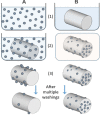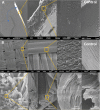Highly efficient and durable antimicrobial nanocomposite textiles
- PMID: 36243757
- PMCID: PMC9568944
- DOI: 10.1038/s41598-022-22370-2
Highly efficient and durable antimicrobial nanocomposite textiles
Abstract
Healthcare associated infections cause millions of hospitalizations and cost billions of dollars every year. A potential solution to address this problem is to develop antimicrobial textile for healthcare fabrics (hospital bedding, gowns, lab coats, etc.). Metal nanoparticle-coated textile has been proven to possess antimicrobial properties but have not been adopted by healthcare facilities due to risks of leaching and subsequent loss of function, toxicity, and environmental pollution. This work presents the development and testing of antimicrobial zinc nanocomposite textiles, fabricated using a novel Crescoating process. In this process, zinc nanoparticles are grown in situ within the bulk of different natural and synthetic fabrics to form safe and durable nanocomposites. The zinc nanocomposite textiles show unprecedented microbial reduction of 99.99% (4 log10) to 99.9999% (6 log10) within 24 h on the most common Gram-positive and Gram-negative bacteria, and fungal pathogens. Furthermore, the antimicrobial activity remains intact even after 100 laundry cycles, demonstrating the high longevity and durability of the textile. Independent dermatological evaluation confirmed that the novel textile is non-irritating and hypoallergenic.
© 2022. The Author(s).
Conflict of interest statement
The antimicrobial textile described in this paper is commercialized by Claros Technologies under the brand name ZioShield. Dr. Abdennour Abbas holds equity in, and is the founder and Chief Technology Officer of, Claros Technologies Inc., which has a license from the University of Minnesota to commercialize the technology described in this manuscript. Andrew Gonzalez holds equity in, and is the Lead Materials Engineer of, Claros Technologies. Dr. John Brockgreitens holds equity in, and is the Director of Research and Development of, Claros Technologies. The University of Minnesota also has equity and royalty interests in Claros. These interests have been reviewed and managed by the University of Minnesota in accordance with its Conflict-of-Interest policies. No other authors have any conflict of interest.
Figures





References
-
- HAI Data. CDC websitehttps://www.cdc.gov/hai/data/index.html (2018).
-
- COVID-19 Impact on HAIs in 2020. CDC websitehttps://www.cdc.gov/hai/data/portal/covid-impact-hai.html (2021).
Publication types
MeSH terms
Substances
Grants and funding
LinkOut - more resources
Full Text Sources
Molecular Biology Databases
Miscellaneous

